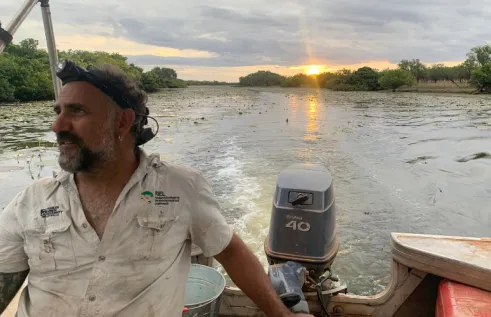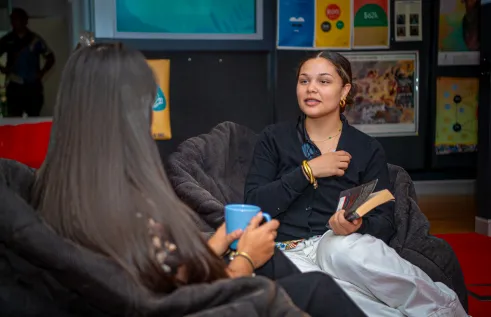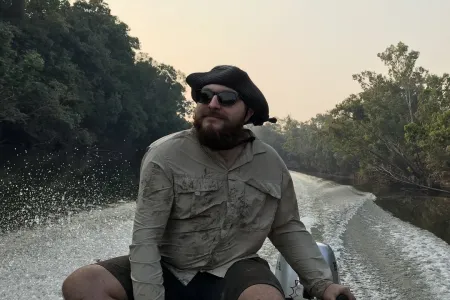RIEL seminar series
Friends or foes? The social behaviours and system of estuarine crocodiles
| Presenter | Dr Cameron Baker | |
|---|---|---|
| Date/Time |
to
|
|
| Contact person | E: riel.outreach@cdu.edu.au | |
| Location | Yellow 1.1.39 or online via zoom | |
| Open to | Public | |
All animal species are inherently social. Regardless of a species' level of gregariousness, individuals must make social decisions to balance the costs and benefits of sharing their environment with conspecifics. However, our understanding of animal sociality has primarily been built on the study of group-living species. Far less attention has been given to understanding the sociality of non-group living species, which are often assumed to lack the social complexity and competence of group-living species. This is mainly due to the difficulty of observing and examining the social behaviours of non-group living species because of the rarity in which interactions occur and the large and often inaccessible areas these animals inhabit.
In this talk, Cameron will demonstrate how techniques and approaches from spatial ecology and socioecology can be integrated to gain insights into the social behaviours and systems of non-group living species. For this, he will be using the estuarine crocodile Crocodylus porosus as his model species. Throughout the talk, Cameron will demonstrate that rather than being ‘asocial’ and intolerant of conspecifics, estuarine crocodiles instead inhabit a highly dynamic social system, where individuals actively control how they associate with conspecifics depending on their maturity status, movement strategy and time of year.
Cameron Baker completed his Bachelor’s degree in Ecology and Zoology at the University of Queensland in 2016. This was then followed by an Honour’s degree in Ecology in 2017 and a PhD in Behavioural Ecology (2018-2022). His focus during these years was on investigating the interface between the spatial and social behaviours of animals, and how this in turn influences a species' ecology and distribution. Cameron started as a Postdoc at RIEL in 2023, where he will be assessing the ecological impact of the large carnivore (crocodile) recovery in the Northern Territory.
Related Events

STATE OF THE DIS-UNION: Media Literacy in the age of AI
The CDU Library is hosting a free panel discussion featuring Northern Territory journalists who will discuss media literacy, truth, and storytelling in the AI era. Attendees can learn how AI is transforming media, ask questions, and improve their understanding of navigating information in today's landscape.
Read more about STATE OF THE DIS-UNION: Media Literacy in the age of AI
Trophic dynamics of free-flowing tropical rivers
Colton Perna's PhD research explores how river flows and flooding shape freshwater fish communities in tropical rivers, using fatty acids to track how hydrology influences food webs and nutritional pathways. His findings highlight the critical importance of river flow and floodplain connectivity in sustaining productive aquatic ecosystems.
Read more about Trophic dynamics of free-flowing tropical rivers
Why Cross‑Cultural Communication Matters in Indigenous-focused Research
A cross‑cultural research partnership grounded in respect, shared knowledge, and educational equity. Discover how collaboration shaped a transformative PhD journey.
Read more about Why Cross‑Cultural Communication Matters in Indigenous-focused Research
